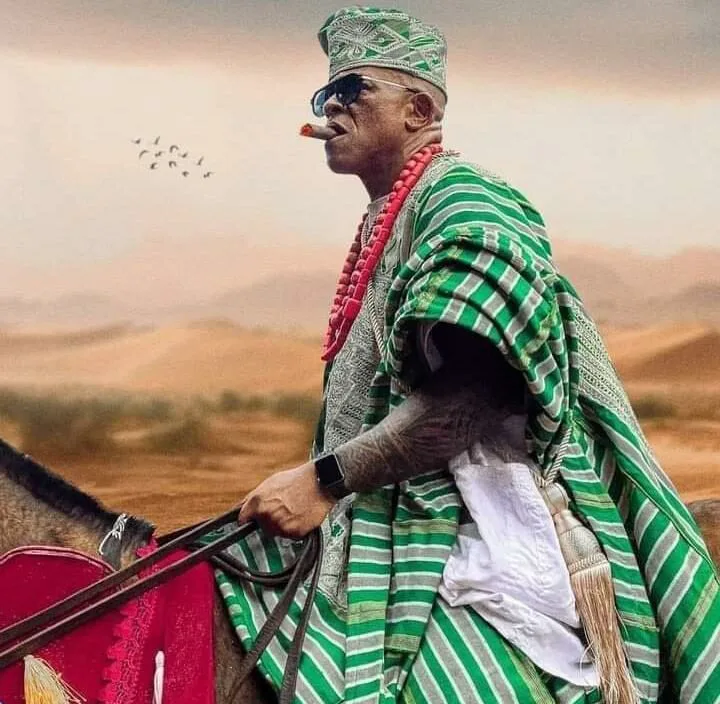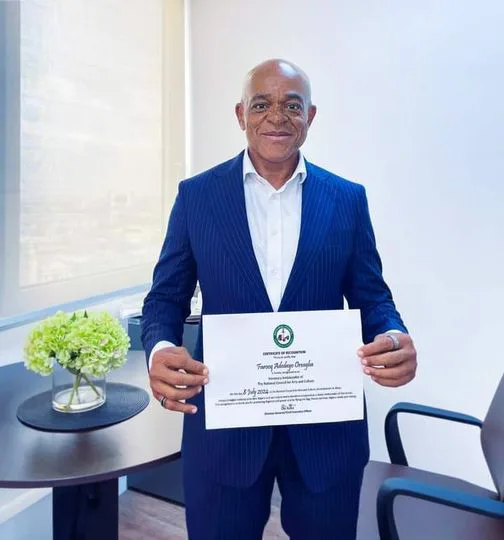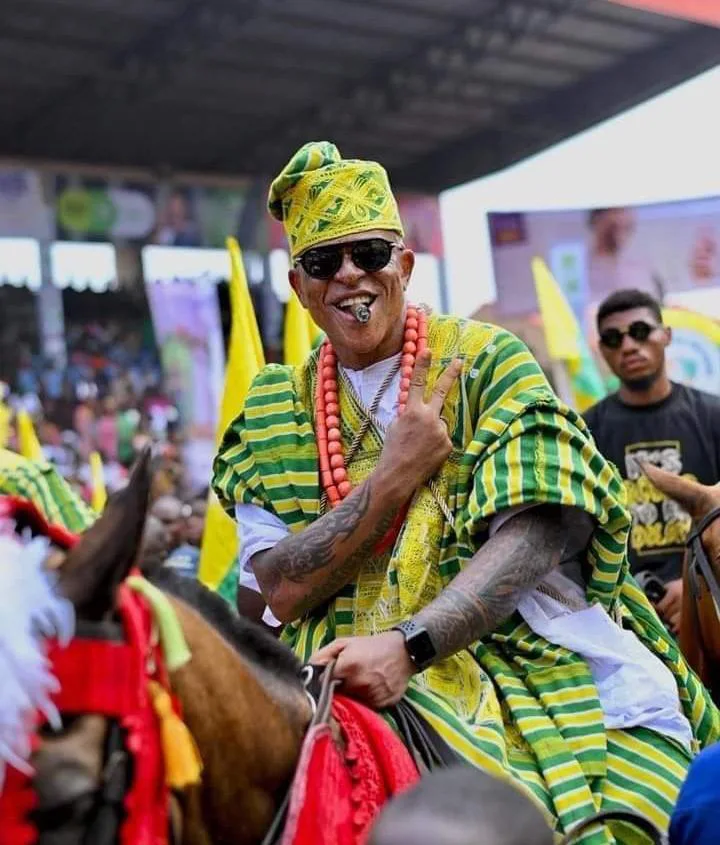
For his standout performance at the 2024 Ojude Oba in Ijebu Ode, which set social media ablaze, the National Council for Arts and Culture has honored him with the title of Honorary Ambassador.
With a cheroot dangling from his mouth, a no-nonsense demeanor, and an impressive equestrian display, he evoked the image of Hollywood legend Clint Eastwood, minus the cowboy hat, as if battling bandits and carpetbaggers in the Texas oil fields.
However, what took place on the third day of Id-el-Kabir, known as Ileya, was far removed from any Western movie. The man in question, Mr. Farook Oreagba, appeared with his age group, known as regberegbe, at Ojude Oba day in Ijebu Ode, Ogun State.
Dressed in an agbada featuring vertical green, grey, and white stripes made of aso ofi, and a white danshiki underneath, he accessorized with maroon beads, black Sani Abacha goggles, and a cap of the same fabric worn at a jaunty angle. He carried a grey scabbard with straps crossing his back like a Middle Eastern warrior, ready to wield a Saracen sword. Periodically, he would raise the sleeves of his agbada as his well-decorated horse moved with measured, graceful steps. His light complexion, conspicuous tattoos, big cigar, and the velvet folds on his neck completed his mafia boss image.

Despite appearances, Oreagba is not connected to the Sicilian Cosa Nostra. He is an Ijebu man who has faced life’s challenges and is now enjoying himself. He returned home for the annual Ojude Oba.
An investment banker, he is currently the managing director of NG Clearing Limited, a position he took on in September 2023. This came after a hiatus from the financial sector due to health issues. Oreagba once shared, “I have several tattoos, most of which are badges of honor and nostalgia. I got three for each of my sons and one Maori tattoo in honor of the All Blacks of New Zealand. Due to my cancer, I lost 80% of my circle of friends but discovered my true friends. Sometimes, an illness like cancer makes you think differently. I now appreciate life more and run awareness campaigns, including one on Parkinson’s.”

According to Esther Ijewere, a social media content creator, “Surviving skin and bone cancer and getting a second chance to live life to the fullest in your 50s is the inspiring story of Mr. Farooq Oreagba, the man who stole the show at the Ojude Oba Festival in Ijebu Ode. He also counsels cancer patients and encourages them to live positively.”
Oriyomi Ajoke, a Human Resources expert and public affairs analyst, added, “Since this picture debuted, reactions have ranged from awe at the man’s charisma to moral judgments about how he chooses to live. Whether or not you agree with what he represented at the festival, you have to admit he stole the show and has become the face of Ojude Oba 2024. Stop hating on him. Hate the game, not the player.” Some conservative Nigerians frowned upon Oreagba’s tattoos.
Oreagba was among those who added fanfare, grandeur, and cultural glamour to the Ojude Oba (The King’s Forecourt) Festival on June 18, 2024, at the Awujale of Ijebuland, Oba Sikiru Adetona’s pavilion in Ijebu-Ode. This year’s theme was “Ojude Oba: Unity and Harmony, Our Gift.”
The festival featured the parade of age groups, horse riding, and colorful dances, with over 90 age groups participating. Attendees included the Awujale of Ijebuland, Oba Sikiru Adetona, CEO of Metropolitan Motors Limited, Olutoyin Okeowo, Group CEO of FCMB Group Plc, Ladi Balogun, and Non-Executive Director of FCMB Group, Prof. Oluwatoyin Ashiru.
In early July, the National Council for Arts and Culture named Oreagba an Honorary Ambassador. Obi Asika, the Director General of NCAC, praised Oreagba’s energy, spirit, and dedication to promoting Nigerian culture, calling him a true Nigerian original.
The Ojude Oba festival has evolved over the years. Originally known as the Odeda festival, it was an annual event where worshippers of traditional religions like Sango, Egungun, Osun, and Ogun showcased their identities through dance and song before the Awujale, Olisa, other chiefs, and townspeople. Later, it became a gathering for the Islamic community, beginning over 100 years ago when early Muslim converts in Ijebu-Ode paid homage to the Awujale, thanking him for allowing them to practice their religion freely.
